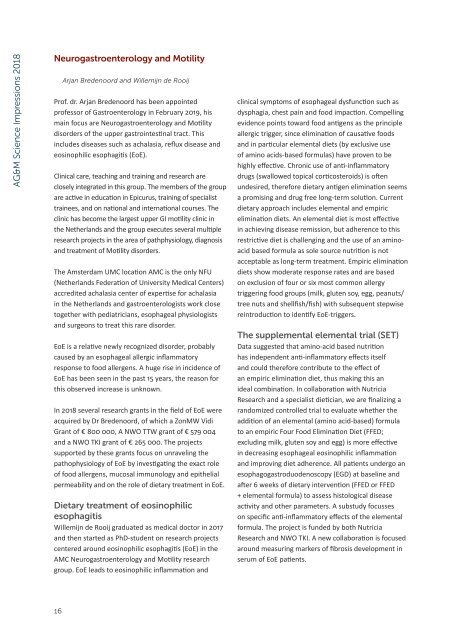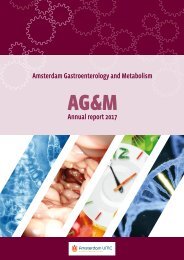AG&M annual report 2018
You also want an ePaper? Increase the reach of your titles
YUMPU automatically turns print PDFs into web optimized ePapers that Google loves.
AG&M Science Impressions <strong>2018</strong><br />
Neurogastroenterology and Motility<br />
Arjan Bredenoord and Willemijn de Rooij<br />
Prof. dr. Arjan Bredenoord has been appointed<br />
professor of Gastroenterology in February 2019, his<br />
main focus are Neurogastroenterology and Motility<br />
disorders of the upper gastrointestinal tract. This<br />
includes diseases such as achalasia, reflux disease and<br />
eosinophilic esophagitis (EoE).<br />
Clinical care, teaching and training and research are<br />
closely integrated in this group. The members of the group<br />
are active in education in Epicurus, training of specialist<br />
trainees, and on national and international courses. The<br />
clinic has become the largest upper GI motility clinic in<br />
the Netherlands and the group executes several multiple<br />
research projects in the area of pathphysiology, diagnosis<br />
and treatment of Motility disorders.<br />
The Amsterdam UMC location AMC is the only NFU<br />
(Netherlands Federation of University Medical Centers)<br />
accredited achalasia center of expertise for achalasia<br />
in the Netherlands and gastroenterologists work close<br />
together with pediatricians, esophageal physiologists<br />
and surgeons to treat this rare disorder.<br />
EoE is a relative newly recognized disorder, probably<br />
caused by an esophageal allergic inflammatory<br />
response to food allergens. A huge rise in incidence of<br />
EoE has been seen in the past 15 years, the reason for<br />
this observed increase is unknown.<br />
In <strong>2018</strong> several research grants in the field of EoE were<br />
acquired by Dr Bredenoord, of which a ZonMW Vidi<br />
Grant of € 800 000, A NWO TTW grant of € 579 004<br />
and a NWO TKI grant of € 265 000. The projects<br />
supported by these grants focus on unraveling the<br />
pathophysiology of EoE by investigating the exact role<br />
of food allergens, mucosal immunology and epithelial<br />
permeability and on the role of dietary treatment in EoE.<br />
Dietary treatment of eosinophilic<br />
esophagitis<br />
Willemijn de Rooij graduated as medical doctor in 2017<br />
and then started as PhD-student on research projects<br />
centered around eosinophilic esophagitis (EoE) in the<br />
AMC Neurogastroenterology and Motility research<br />
group. EoE leads to eosinophilic inflammation and<br />
clinical symptoms of esophageal dysfunction such as<br />
dysphagia, chest pain and food impaction. Compelling<br />
evidence points toward food antigens as the principle<br />
allergic trigger, since elimination of causative foods<br />
and in particular elemental diets (by exclusive use<br />
of amino acids-based formulas) have proven to be<br />
highly effective. Chronic use of anti-inflammatory<br />
drugs (swallowed topical corticosteroids) is often<br />
undesired, therefore dietary antigen elimination seems<br />
a promising and drug free long-term solution. Current<br />
dietary approach includes elemental and empiric<br />
elimination diets. An elemental diet is most effective<br />
in achieving disease remission, but adherence to this<br />
restrictive diet is challenging and the use of an aminoacid<br />
based formula as sole source nutrition is not<br />
acceptable as long-term treatment. Empiric elimination<br />
diets show moderate response rates and are based<br />
on exclusion of four or six most common allergy<br />
triggering food groups (milk, gluten soy, egg, peanuts/<br />
tree nuts and shellfish/fish) with subsequent stepwise<br />
reintroduction to identify EoE-triggers.<br />
The supplemental elemental trial (SET)<br />
Data suggested that amino-acid based nutrition<br />
has independent anti-inflammatory effects itself<br />
and could therefore contribute to the effect of<br />
an empiric elimination diet, thus making this an<br />
ideal combination. In collaboration with Nutricia<br />
Research and a specialist dietician, we are finalizing a<br />
randomized controlled trial to evaluate whether the<br />
addition of an elemental (amino acid-based) formula<br />
to an empiric Four Food Elimination Diet (FFED;<br />
excluding milk, gluten soy and egg) is more effective<br />
in decreasing esophageal eosinophilic inflammation<br />
and improving diet adherence. All patients undergo an<br />
esophagogastroduodenoscopy (EGD) at baseline and<br />
after 6 weeks of dietary intervention (FFED or FFED<br />
+ elemental formula) to assess histological disease<br />
activity and other parameters. A substudy focusses<br />
on specific anti-inflammatory effects of the elemental<br />
formula. The project is funded by both Nutricia<br />
Research and NWO TKI. A new collaboration is focused<br />
around measuring markers of fibrosis development in<br />
serum of EoE patients.<br />
16



